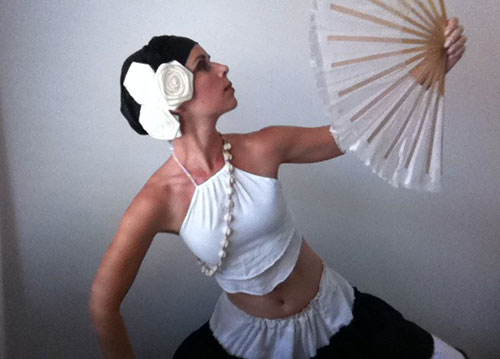
Annie Hollingsworth on “Red Eyes”
Annie Hollingsworth, director of Mayami Folklorico and one of “The New Times’” 100 Creatives, will present a work-in-progress titled “Red Eyes” (Je Wouj) at the Little Haiti Cultural Center this Friday, July 29. Choreographed in collaboration with Ann Mazzocca, “Red Eyes” explores the rich, spirit-driven traditions of Haitian and Afro-Cuban dance from a Western perspective. In this interview, Hollingsworth discusses her inspiration and goals for the performance and what it’s like working in collaboration with other artists, dancers, musicians and choreographers.
Neil de la Flor: What can you tell us about “Red Eyes” (Je Wouj)?
Annie Hollingsworth: “Red Eyes” (Je Wouj) approaches Haitian and Afro-Cuban dance from a Western contemporary perspective. We are specifically working with Haitian Petwo and Afro-Cuban Palo. Both represent the use of elemental energies to create intense transformation. Their exact origins are debated, especially Haitian Petwo, but many place them at the same source in the Kongo area of Africa. The title specifically refers to the fiery lwa (spirits or deities) from Haitian Vodou associated with the Petwo rhythms and rites.
ND: What were your inspirations and goals for the work?
AH: Dances are languages that travel around the world embedded in the bodies and spirits of the people who have learned them. Our goal is to explore Petwo and Palo not only as powerful forms in themselves, but also as dance languages that resonate with contemporary life in Miami and New York, both highly multicultural cities. As the company was working on this piece, Haiti’s revered musician Azor, known for intense non-stop performances of traditional Petwo rhythms, passed away. He was hugely important to Haiti’s racine movement and his band, Racine Mapou de Azor, brought Haitian music to the world. Azor was also the inspiration for my love of Haitian dance, music and culture. “Red Eyes” (Je Wouj) is dedicated to his spirit and in celebration of the contributions he made. For this performance, we are presenting “Red Eyes” (Je Wouj) as a work in progress. Audiences will have a chance to see how we are approaching folklore as a contemporary form.
ND: How did you get involved with “The Games We Play?”
AH: Afua Hall, the organizer, approached me about performing in the festival, and I’m really pleased to be a part of the program. It’s a great line-up. Many of the other choreographers are also using so-called traditional dance forms in contemporary and original ways, breaking the often rigid divisions between styles of dance, how they should be performed and by whom. At its core, “The Games We Play” feels like a very experimental and optimistic project.
ND: What’s next for Annie Hollingsworth?
AH: I am the director of Mayami Folklorico, but in principle, it is a collaborative project that invites dancers, musicians and choreographers to come together under the company’s mission. We are in the first stage of our development, and we have some exciting new pieces planned. This summer and fall will be devoted to intense choreographic work and creative experimentation. You can catch us this fall at the Wynwood Art Fair, where we will officially premier our first repertory pieces. And always, in parallel to my creative work, I am involved in the visual art and dance worlds, primarily as a writer.
Friday, July 29, 2011, 7 p.m., “The Games We Play,” an evening of multicultural dance at the Little Haiti Cultural Center, featuring contemporary and traditional choreography by South Florida-based choreographer/dancers Sandra L. Portal-Andreu, Asha Darbeau, Anasthasia Grand-Pierre, Ronderrick Mitchell, Afua Hall, Annie Hollingsworth/Mayami Folklorico, Petagay Letren, Ana Miranda, Megan Swick and Natasha Williams. Also on the bill is Millicent M. Johnnie, formerly of N.Y.C.’s Urban Bush Women. 212 N.E. 59th Terrace, Miami, Fla 33137. Admission is free.
Recent Content
-
Artsarticle ·
-
Artsarticle ·
-
Artsarticle ·
